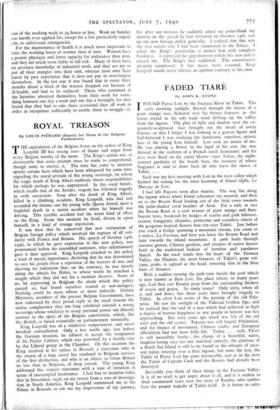ROYAL TREASON
By LOUIS PIERARD (Deputy for Mons in the Belgian Parliament) THE capitulation of the Belgian Army on the orders of King Leopold III has wrung tears of shame and anger from every Belgian worthy of the name. The King's action was so abominable that some attempt must be made to comprehend, though none to excuse, it. The time has come to mention openly certain facts which have been whispered for some time regarding the moral attitude of this young sovereign, on whom the tragic death of King Albert suddenly thrust responsibilities for which perhaps he was unprepared. In this royal family, which recalls that of the Atrides, tragedy has followed tragedy in swift succession. Soon after the death of King Albert, killed in a climbing accident, King Leopold, who had just ascended the throne, saw his young wife, Queen Astrid, meet a frightful death in a motor accident when he himself was driving. This terrible accident had the worst kind of effect on the King. From that moment he lived, driven in upon himself, in a kind of strange mysticism.
It was then that he conceived that new orientation of Belgian foreign policy which involved the rupture of all soli- darity with France and Britain. His speech of October i4th, 1936, in which he gave expression to this new policy, was pronounced before his assembled ministers, who unfortunately gave it their approval. King Leopold attached to this policy a kind of mystic importance, declaring that he was determined to save his people from a repetition of the horrors of war, and showing no realisation that, on the contrary, he was merely oiling the wheels for Hitler, to whose words he attached a weight which they did not for a moment deserve. Some of us, by expressing in Belgium the alarm which this policy caused us, had found ourselves treated as war-mongers. Nothing could be more odious or more imbecile. Certain Ministers, members of the present Belgian Government, have now redeemed by their proud reply to the royal treason the undue complacency they too long exhibited towards a young sovereign whose tendency to usurp personal power ran directly counter to the spirit of the Belgian constitution, which, like the British, is based essentially on parliamentary monarchy.
King Leopold was of a vindictive temperament, and never brooked contradiction. Only a few weeks ago, just before the German invasion, he refused to accept the resignation of the Pierlot Cabinet, which was provoked by a hostile vote by the Liberal group in the Chamber. On this occasion the King received at his palace in Brussels a statesman who in the course of a long career has rendered to Belgium services of the first distinction, and who is an object, in Great Britain no less than in Belgium, of deep esteem. The young King addressed this veteran statesman with a tone of irritation in terms of unexampled intolerance. I fed free to mention today that in November, 1936, on my return from a tour of investiga- tion in South America, King Leopold summoned me to the Palace in Brussels to ask me my impressions of my journey, but after ten minutes he suddenly asked me point-blank my opinion on the speech he had delivered on October 14th, and on the new foreign policy generally. I realised that that was the true reason why I had been summoned to the Palace. I asked the King's permission to answer him with complete frankness. I expressed the apprehension which this new policy caused me. The King's face reddened. The conversation abruptly terminated. It has never been resumed. King Leopold would never tolerate an opinion contrary to his own.


































 Previous page
Previous page